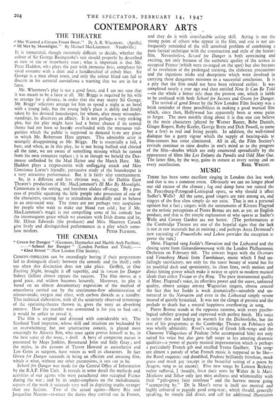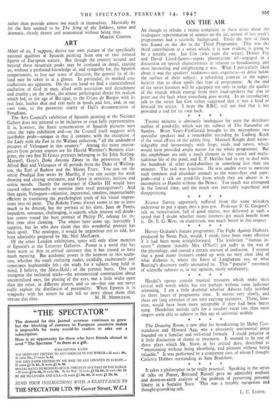MUSIC
THERE has been some excellent singing in London this last week, and that is not a common event. Obviously we can no longer plead our old excuse of the climate ; fog and damp have not ruined the St. Petersburg-Petrograd-Leningrad opera, so why should it affect Sadler's Wells? All the same, good singers are rare among us, and singers of the first class simply do not exist. That is not a personal opinion but a fact ; singers with the instruments of Kirsten Flagstad or the artistic perceptions of Pierre Bernac are not, as yet, an English product, and that is the simple explanation of why operas at Sadler's Wells and Covent Garden are not better. (The performances at the Cambridge Theatre are one of the hopeful signs that the lack is not in raw materials but in training ; and perhaps Astra Desmond's new recording of Frauenliebe und Leben provides the exception tc prove the rule.)
Mme. Flagstad sang Isolde's Narration and the Liebestod and the closing scene from Gotterdiirnmerung with the London Philharmonic Orchestra on February 6th. The concert began with the Overture and Venusberg Music from Trennhauser, music which I find un- failingly satisfactory, not only for the sheer beauty of sound but for its youthful dash and spontaneity; its clean lines, swift motion and direct hitting power which make it nearer in spirit to modern musical ideals than either Tristan or the Ring. The pure instrumental quality of Mme. Flagstad's voice, its effortless power and the suave, unforced quality, almost unique among Wagnerian singers, almost conceal the fact that her Isolde is weak dramatically—unsubtle and un- tortured in the Narration and even in the Liebestod simply serene instead of quietly hysterical. It was not the climax of passion and the prelude to death but a natural happiness overflowing in song.
Pierre Bernac stands at the opposite extreme, with every psycho- logical subtlety grasped and expressed with perfect finish. His voice is rather thin and lacking in warmth for the Dichterliebe, but the rest of his programme at the Cambridge Theatre on Febtuary 9th was wholly admirable. Ravel's setting of Greek folk-songs and the Chansons Villageoises of Poulenc (who accompanied him) not only suited his voice but also gave full scope to his amazing dramatic qualities—a power of purely musical impersonation which is perhaps a particularly French gift and recalled Yvette Guilbert. The songs are almost a parody of what French music is supposed to be like— the Ravel exquisite and dandified, Poulenc brilliantly frivolous, mock grave and mock gay (except in the beautiful setting of a poem by Aragon, sung as an encore). Five new songs by Lennox Berkeley rather suffered, I thought, from their texts by Walter de la Mare. Mistletoe and Silver only just miss archness and whimsicality with their "pale-green fairy mistletoe" and the harvest mouse going "scampering by." De la Mare's verse is itself too musical and highly coloured to provide good song-texts, which should, generally speaking, be simple and direct, and call for additional illustration rather than provide almost too much in themselves. Musically by far the best seemed to be The Song of the Soldiers, tense and dramatic, clearly drawn and economical without being thin.
MARTIN COOPER.



































 Previous page
Previous page